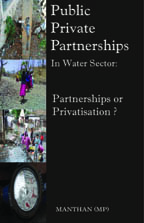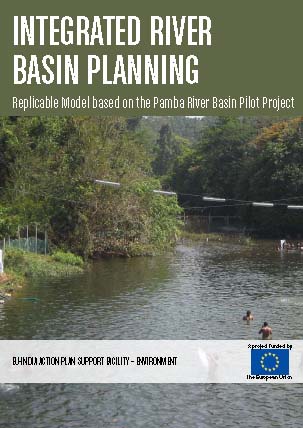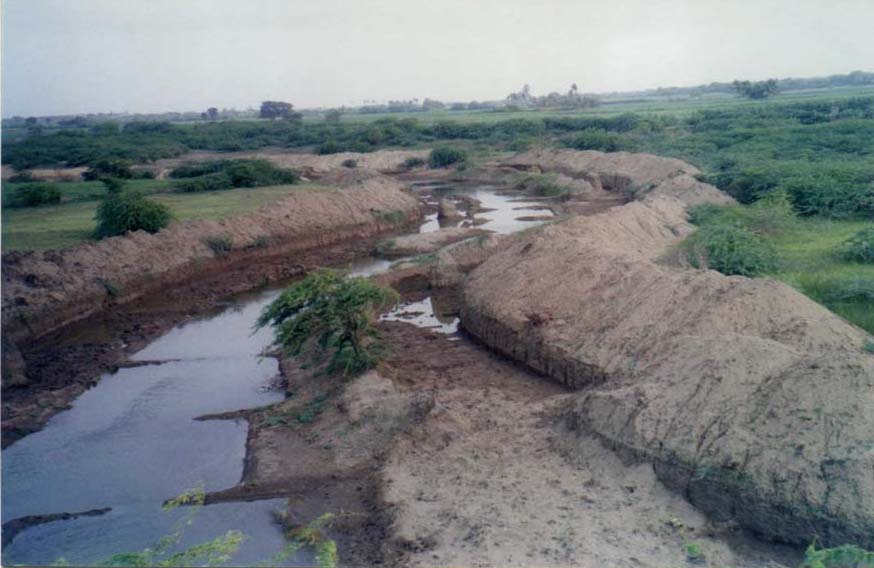/topics/water-management
Water Management
Soil biotechnology installation and water interventions at ACCEPT Society, Bangalore - Videos by Arghyam
Posted on 23 Jun, 2011 12:15 PM
Water interventions in the society
The society is an AIDS care hospice of about 5 acres, on the outskirts of Bangalore.
Public Private Partnerships in the water sector: Partnerships or privatisation - A report and video by Manthan Adhyayan Kendra
Posted on 21 Jun, 2011 05:29 PM
This report and video by Manthan Adhyayan Kendra, looks at various aspects of PPPs, beginning from why PPPs have come to be regarded as the major approach for infrastructure development in the country, the circumstances that lead to the change in approach from direct privatisation to public-private partnerships, the current status of the PPP projects that are being executed in India, especially in the water sector, to the current estimates and projections of investment requirements for infrastructure development in India by governments and International Financial Institutions (IFIs).
Water seminar on 'Partnerships for sustainable water management': 4th edition of the Gujarat Water Summit, organised by Confederation of Indian Industry on July 16, 2011 in Ahmedabad
Posted on 20 Jun, 2011 05:16 PM
Organizer: Confederation of Indian Industry (CII)
Venue: Hotel Grand Bhagawati, Ahmedabad
Background
Water is fast emerging as the key resource of the future. The demand for fresh water is growing at a tremendous pace, aided by a growing population and increased levels of industrialization. Discharge of untreated industrial and domestic waste water to existing fresh water bodies is another cause of concern, as it diminishes the availability of fresh water resources. Both the State and Central Governments have taken cognizance of this need to augment water availability, which is reflected in the growing investments in the water and sanitation sector.
Workshop on 'Water and wastewater analysis', SEA, SERI, 26th - 31st July, 2011, Pune
Posted on 17 Jun, 2011 12:29 PMOrganizers:
- Shrushti Environment Academy (SEA), Pune
- Shrishti Eco-Research Institute (SERI), Pune
- Indian Environment Association (IEA), Pune Chapter
- Aavanira Biotech Pvt. Ltd., Pune
Venue: ‘Growth Lab’ Science & Technology Park, Pune-Nashik road, Opp. Panjerpole, Bhosari, Pune
International Water Management Institute is looking for Administrative Assistant at New Delhi – Apply by 6th June, 2011
Posted on 31 May, 2011 05:12 PMContent courtesy: DevNetJobsIndia
International Water Management Institute (IWMI), is a non-profit scientific research organization, one of the 15th International Institutes under the Consultative Group on International Agricultural Research (CGIAR), with its world headquarter at Colombo, Sri Lanka. IWMI is engaged in various aspects of water and land management and has its offices located in New Delhi and Hyderabad.
Integrated River Basin Planning – Experience on policy and practice in Pamba River Basin in Kerala – A report by APSF Environment Project
Posted on 30 May, 2011 09:50 PM The Pamba Pilot Project’s aim was to deliver “Policy Support to Integrated River Basin Management” and to contribute to the continuing EU-India policy dialogue in the water sector.
The Pamba Pilot Project’s aim was to deliver “Policy Support to Integrated River Basin Management” and to contribute to the continuing EU-India policy dialogue in the water sector.
Call for Papers: Water Grabbing? - Water Alternatives - Last date to send abstract 30th June, 2011
Posted on 30 May, 2011 03:51 PMWater Alternatives (WaA) is an interdisciplinary journal addressing the full range of issues that water raises in contemporary societies. Its ambition is to provide space for alternative and critical thinking on such issues. WaA welcomes contributions that address any dimension of water resources development, management and use, and their relations with society and the environment.
Khadkipada, Maharashtra - A tale of development, an account of transformation - A film by WOTR on the Water Channel
Posted on 26 May, 2011 01:42 PM
Interlinking of water harvesting structures through link water channels - A viable alternative at micro-level by Ambuja Cement Foundation
Posted on 25 May, 2011 07:39 PM The coastal areas of Gujarat especially the villages lying within 20-25 km from the seashore are suffering from the problem of salinity ingress. Most of the rivulets that drain this region like Goma and Somat are seasonal at best and their water does not last beyond monsoons. The other aquifers like ponds, which get water from these rivers, also dry up as early as October.
The coastal areas of Gujarat especially the villages lying within 20-25 km from the seashore are suffering from the problem of salinity ingress. Most of the rivulets that drain this region like Goma and Somat are seasonal at best and their water does not last beyond monsoons. The other aquifers like ponds, which get water from these rivers, also dry up as early as October.
A perspective of watershed development in the central Himalayan state of Uttarakhand – A paper by Malavika Chauhan
Posted on 25 May, 2011 08:23 AMIt traces the historical growth of thinking on watershed in the region, and highlights issues and influences. Impacts and benefits are discussed in relation to sustainability. The review shows that success in these projects is usually isolated, mostly seen in small micro-watersheds with naturally good water harvesting conditions.







